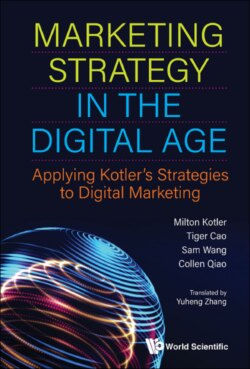Читать книгу Marketing Strategy In The Digital Age: Applying Kotler's Strategies To Digital Marketing - Milton Kotler - Страница 9
На сайте Литреса книга снята с продажи.
Foreword
ОглавлениеRebuilding Marketing Strategies in the Digital Age
The four authors of this book are all my students, friends, consulting partners and sources of inspiration. It is a real pleasure to see their new work.
As a cross-disciplinary branch of management and economics, marketing has been increasingly tied to psychology, computer science, data science and sociology in the last decade, which corresponds to my point that “marketing is both a science and an art”. Marketing plays an increasingly important part in corporate strategy planning: from product positioning to corporate positioning, from business brands to corporate brands, from channel to business model transformation and from brand asset to client asset management. Undoubtedly, marketing is the most important driving force for companies and CEOs to bring about strategic transformation. All business leaders with whom I have had contact, such as Louis Gerstner, Jeff Bezos, Mark Zuckerberg, Richard Branson and Alan G. Lafley, are excellent CEOs and also extraordinary marketing directors. The strategic and social role of marketing is growing exponentially. That is also the reason why Dr. Hermawan, another partner of mine, has successfully persuaded the Indonesian President to sponsor the construction of the world’s first marketing museum in Bali.
Different from the time when I wrote the first edition of Marketing Management in 1965, we are now in a “digital society”. This round of revolution took place in America, Europe, China and even Africa, significantly transforming infrastructure and social mentality. Then the concept of “digital transformation” was proposed as many enterprises were eager to find a way to integrate with the Internet. However, as the writers stated in the book, the Internet and mobile Internet build the “connections” between “individuals and things, individuals and information, as well as individuals and individuals”. Therefore, how to change strategies, improve the role of marketing and adopt emerging technological and data tools in the connection are issues faced by all senior marketing executives and CEOs.
The authors of this book are trying to answer these questions. To my delight, they have perceived not only what has changed but also “what remains unchanged” in digital marketing. The goal of rolling out a digital strategy is not to disrupt existing marketing, but to complement, integrate and develop the two at the same time. Demand management is always the priority in marketing since we cannot forget our original intention; otherwise, it is of no use to adopt better technology or to introduce more data. When I talked with our authors and partners, they raised an interesting question that was discussed by Chinese officials 150 years ago — whether “China should use western technologies to complement Confucian values and systems” or vice versa, as they faced the cultural shock from the west. It is a pleasant surprise for me to see that the writers provided detailed discussion and practical analysis on whether marketing should serve digital technologies or vice versa in the digital age.
The authors, with excellent theoretical basis, have long been active consultants. Their new framework is established based on years of interaction with CEOs and on hundreds of KMG consulting cases. Different from other books on “digital marketing”, it is more like “a digital marketing strategy for CEOs” with elaborate explanations on all aspects from strategic thinking to implementation framework. We are now in an age when changes in the world go beyond the changes in theories, and therefore, I hope that in the near future the content and framework will change with the times while also holding on to the essence of marketing at the same time.
Dr. Philip Kotler
